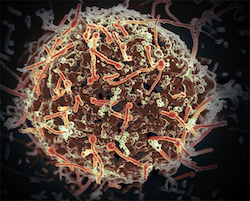 |
| Ebolavirus--Courtesy of NIAID |
As Zika virus continues to capture the public's--and industry's--attention, experts are warning that complacency might lull vaccine makers into shelving their Ebola vaccine efforts.
The World Health Organization declared that the most recent Ebola epidemic is no longer a global public health emergency, and ABC News reported the Obama administration has decided on diverting leftover funds from the "largely successful" fight against Ebola toward combating Zika. But Wellcome Trust Director Jeremy Farrar cautioned that "The job is still not done," Reuters reported. "As Ebola infection rates come under control it's a huge concern that complacency sets in, attention moves to more immediate threats and Ebola vaccine development is left half-finished," he said.
As many as 13 Ebola candidates made it to Phase I or Phase II trials, but only a handful of Big Pharmas, including Merck ($MRK), Johnson & Johnson ($JNJ) and GlaxoSmithKline ($GSK), advanced their jabs into Phase III. The waning of the epidemic was a double-edged sword, however: while fewer Ebola cases meant fewer people falling ill and dying, it also meant fewer opportunities to test vaccines against the virus. Merck had to improvise a "ring" study to get Phase III data proving safety and efficacy.
In a report on the world's progress toward Ebola immunization, Michael Osterholm, director of the University of Minnesota's Center for Infectious Disease Research and Policy (CIDRAP) warned that global health officials should not believe this progress has "solved the problem of Ebola." Osterholm called for continuing trials to garner more safety and efficacy data and for working with African public health leaders on how vaccines can be used or evaluated in new outbreaks, Reuters reported.
While none of the candidates have made it to licensure, Merck, armed with a $5 million grant from GAVI, is on track to file for regulatory approval in 2017, about three years after the epidemic broke out. Merck has filed an emergency use application with the WHO, which, if approved, will allow the experimental vaccine to be used if there is another outbreak before it is licensed.
Aside from Merck, news on the Ebola vaccine development front has been sparse of late. Russia announced in February that an Ebola vaccine developed there did well in Phase I and II trials and is slated to enter further testing in Guinea. And Pennsylvania's Inovio Pharma ($INO) announced last week that its Ebola candidate was safe and induced a "robust" immune response in a 75-person Phase I trial.
- read more from Reuters
- here's the Inovio release
- and here's more about the Obama administration's decision from ABC News